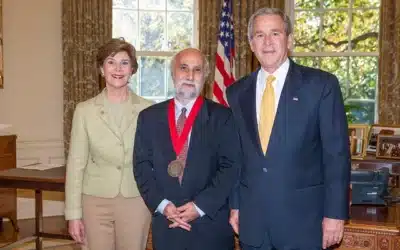Controversy erupted in Canada last month over a Christian singer from California who is on tour in the country. Sean Feucht, a former worship leader at the well-known Bethel Church who is known for opposing COVID lockdowns and holding traditional conservative beliefs, had his venue permits revoked in all six Canadian cities that he was planning to perform at in July, including Quebec City, Ottawa, and Toronto. Officials cited public safety concerns, since Feucht was expected to draw protestors due to his contentious views, specifically his support of the MAGA movement and his opposition to LGBTQ causes and abortion.
Feucht was able to secure alternative venues for all six cities, which represented the first Canadian leg of his Revive in 25 tour, but the challenges he faces continue to grow. Some of the cities he planned to sing at in August, when he will be in Western Canada, have already cancelled their permits as well, citing similar concerns.
“The presence of a controversial artist was not mentioned when the contract was signed,” said François Moisan, Quebec City’s director of public relations, regarding the city’s decision to cancel their contract.
Feucht responded to the decisions with a statement posted to X on July 24:
My official Statement on the Let Us Worship Canada Tour
Here’s the hard truth: If I had shown up with purple hair and a dress, claiming to be a woman, the government wouldn’t have said a word. But to publicly profess deeply held Christian beliefs is to be labeled an…
— Sean Feucht (@seanfeucht) July 24, 2025
While all six cancellations were at public (government-managed) venues, a private venue has also become part of the story. On July 25, Feucht hosted an event at Église MR, a Spanish-speaking church in Montreal. The church was warned in advance that it did not have the required permit to host the event, and was issued a $2,500 fine after the event took place.
“The church did not have a permit to organize a concert,” said Catherine Cadotte, a spokesperson for the city. But was it really a “concert”? “This is not a performance—it’s a church service,” Feucht insisted before the event. A number of protestors were gathered outside the church during the event, and one even threw a smoke bomb inside the church while attendees were worshipping.
A Canadian legal group called The Democracy Fund, founded in 2021, expressed its intention to fight the fine in court.
“Freedom of religion is a fundamental freedom under s.2(a) of the Charter: you do not need permission or a permit from the government to worship at a church in Canada,” said Democracy Fund litigation director Mark Joseph. “It is absurd to suggest otherwise, and it risks setting a dangerous precedent that will extend to all religions.”
The reaction to the whole saga has been mixed, with some defending the decisions to cancel permits and issue the fine and others, including some progressives who deeply disagree with Feucht, voicing concerns.
One such progressive is Carl Wilson, a writer and editor from Toronto who is currently the music critic for Slate. “I hate to say it, but let the bigot sing” was the title of a July 28 post on his Substack regarding this story. In an interview about the post, Wilson spelled out why, despite his fierce disagreement with Feucht, he is opposed to the actions that have been taken against the singer.
“I’m a social democrat…but I think it’s a mistake for the left to give in to censorious impulses, and particularly to ask the state…to use its power to intervene and stop speech that we don’t like,” he said. “We’ve made a cause out of Sean Feucht in a way that serves his agenda,” Wilson continued. “He’s allowed to portray himself as a martyr, and we’re giving him a legitimate complaint.”
James Turk, director of the Centre for Free Expression at Toronto Metropolitan University, has expressed similar concerns. “I fear that, as in many cases, the use of security as an excuse is just that—an excuse to otherwise to deny what’s a fundamental right of freedom of expression in this country,” he said.
Stephen Newman, a professor emeritus in the politics department at York University in Toronto, astutely points out that this is a classic example of a “heckler’s veto,” where a speaker is silenced because authorities are concerned that negative reactions to their speech would threaten public safety—thus giving dissenters de facto power to shut down speech merely by threatening chaos.
Feucht, for his part, is taking it all in stride, seeing the media attention as a great opportunity to spread his message. “God is using this to provoke a nationwide conversation about freedom of religion, and just testing how tolerant these tolerant people are,” he said in an interview. “What the enemy meant for evil, God turned it around,” he continued. “It’s like the Streisand effect. Their efforts to cancel only let people know about it. We had people running down to the alter giving their lives to Jesus that didn’t even know that I was coming twenty-four hours before, but they saw the commotion and wanted to see what it was all about, and God in the midst of that saved their soul.”
So what is the libertarian take on all this?
At first glance, an observer might assume that libertarians, much like conservatives, oppose the fine and the revoked public-venue permits on the familiar grounds of freedom of religion, freedom of expression, and so on. And to be sure, libertarians by and large have great sympathy for that position.
But it would be a mistake to say that this position accurately represents the principled libertarian perspective.
The true libertarian perspective is grounded, not in vague notions like “freedom of expression” or “freedom of religion” but in private property rights. It’s not that government-managed venues should host a diverse range of events for the sake of “free speech,” it’s that government-managed venues shouldn’t exist—they should all be privatized, and then the private owners should be allowed to manage their venue as they see fit, including being discriminatory if they so choose (and people who don’t like that can of course boycott, if they so choose).
As regards the fine at the Montreal church, libertarians do not protest the fine because it happened to be a religious event. Rather, we protest it because, on principle, a private property owner should never have to obtain government permission (hence the word “permit”) to host any peaceful activities on their property, no matter the nature of the activities.
In short, while conservatives complain that government venues should be managed more openly, libertarians say government venues shouldn’t exist at all. And while conservatives complain that a permit law is being applied inappropriately, libertarians argue that the entire category of permit laws shouldn’t exist in the first place.
These are crucial distinctions, ones that unfortunately get little to no airtime even in alternative media spaces, because there are so few of us articulating the principled libertarian perspective on the issues of the day.
Especially here in Canada.
All that to say, libertarians should resist the temptation to simply echo conservative “pro-freedom” rhetoric. We have a rich, distinct philosophical tradition, and truly winning the battle for freedom requires us to articulate and defend that tradition, not the safe knockoff version that is designed to accommodate mainstream sensibilities.
































